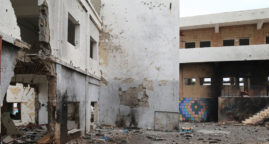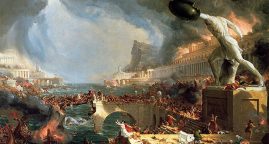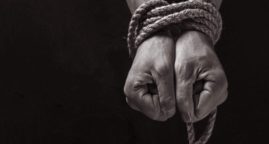Most ‘precious’ and ‘scarce’ resource of our time is dialogue, UN chief tells Doha policy forum
Article published on United Nations website on 12/16/2018.
Following a productive two weeks of global dialogue for the United Nations and its Member States, alongside governments and advocates, Secretary-General António Guterres, speaking in the Qatar capital, Doha, underscored the importance of international cooperation in the “enormous challenges” of our time, drawing the curtain on a job finished at Sunday’s Doha Forum.
Recapping his recent participations in the successful adoption of the Global Compact on Migration in Marrakech, an agreement on a ‘rulebook’ in Poland laying out the way forward for the 2015 Paris climate accord , and a breakthrough in Yemen peace talks in Sweden, Mr. Guterres said “each of these… underline a core reality in today’s world.”
“To put it simply: We face enormous challenges that can’t be solved by any country on its own,” he told attendees at the two-day meeting ‘s conclusion.
From Saturday to Sunday, policy leaders at the Doha Forum discussed international alliance, and addressed topics of terrorism, cybertechnology, and the media, among others.
On the Forum’s sidelines, heads of the UN Office of Counter-Terrorism (UNOCT) and the State of Qatar, along with Vladimir Vorokonkov and Major General Abdul Aziz Al Ansaari, respectively, jointly signed a Contribution Agreement whereby Qatar agreed to support UNOCT’s counter-terrorism strategy implementation.
Qatar’s contribution of $75 million, which will be stretched over a period of five years, includes support for strengthening the counter-terror office’s strategy, backing efforts to support victims of terrorism, and preventing violent extremism.
The committment is one of a host of new agreements signed between Qatar and the UN on Sunday, Mr. Guterres shared during his briefing to journalists, and praised such strides as a “quantum leap” in the Qatar-UN relationship.
The funds for strengthening the UN’s counter-terrorism activities were part of a full pledge from Qatar that amounted to $500 million. There will also agreements to provide annual support to UN Developmental Programme (UNDP), the UN Children’s Funsd(UNICEF), the UN Relief and Works Agency for Palestine Refugees in the Near East (UNRWA), the UN High Commissioner for Refugees.
In his keynote address, Mr. Guterres said: “Perhaps the most precious – and increasingly scarce – resource in our world today is dialogue,” he said, and added that more exchanges like those taking place at the Forum are needed, but dwindling trust is paralyzing the conversation. He said platforms like the Doha Forum, which nurse the exchange of ideas, are lacking in number, but vital.
“As I said at the UN General Assembly, our world is suffering from a bad case of trust deficit disorder.”
“The world is more connected, yet societies are becoming more fragmented,” he decried. “Challenges are growing outward while many people are turning inward.”
“This is the ultimate paradox in today’s world,” he said, calling it a chaotic “in-between” period for world order, and pointing to fear as the ultimate driver.
“The best-selling brand in our world today is fear. It gets ratings. It wins votes. It generates clicks.”
The UN’s duty in conflict is that of “an honest broker,” and “impartial element,” Mr. Guterres explained to students at Hamad Bin Kahlifa University as part of his visit to Doha.
The 2030 Agenda for Sustainable Development sets ambitious goals for its Member States to tackle the complex challenges of our time, which the UN chief nominated as “the blueprint” for the important role of fair globalization.
Spotlighting climate change, Mr. Guterres said this challenge is a battle for our future, “and in this conflict, nature does not negotiate,” but to our advantage, emerging technologies can help us overcome this scourge, so long as such developments are monitored.
To ensure the “pace and promise” of technology is responsibly maximized, he urged for investment in education, a new generation of support for people struggling to adapt, and a need for collective mobilization, to ensure technology will be “a force for good.”
Mr. Guterres highlighted that just as the tech sector is transforming, so are our livelihoods; which encompass the work-life balance which will be “completely different in the future we are facing.”
“We need an education, not to learn how to do things, but to learn how to learn because many of those that are today in schools and universities will have jobs that simply do not exist and are not even envisionable today.”
He concluded his address on a hopeful note, applauding recent milestones by nations who have championed war and poverty through effective collaboration.
“When we work together, we can achieve great things for the good of all people.”
“International cooperation works. and that cooperation has never been more critical to repair broken trust and uphold dignity for one and all.”
Related Articles
Donors pledge $2 billion to scale up aid delivery in Yemen
04/03/2018. An appeal that raised some $2 billion to help millions of people in Yemen was a “remarkable success of international solidarity” – Antonio Guterres.
The crisis of multilateralism and the future of humanitarian action
11/30/2016. Long before the November 2016 US elections, there were clear signals that multilateralism was in crisis. In fact, Donald Trump’s election is just the continuation of a downward spiral that has been under way for some time.
Order of Malta stands with Pope Francis in fight to end Human Trafficking
Article published on Vatican news website on 07/30/2018 by Francesca Merlo July 30th marks the annual World Day Against Trafficking






